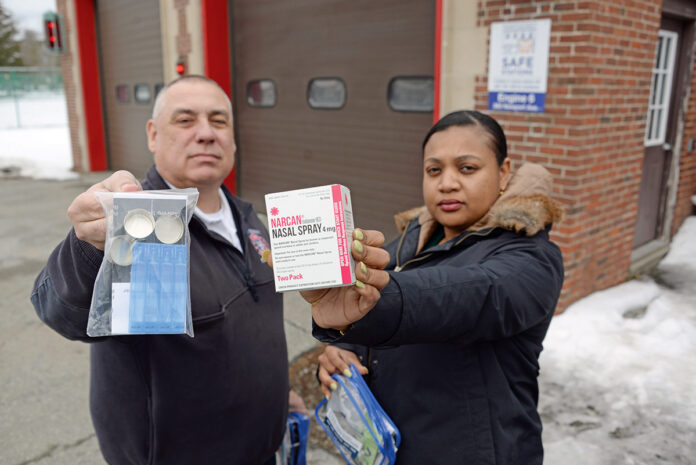Rhode Islanders who are struggling with substance abuse now have places they can go to get immediate attention and support, after fire departments and police stations in eight Rhode Island communities created “Safe Stations.”
Pawtucket was the latest to establish the 24/7 outreach centers, doing so at the city’s five fire stations in January. The city joins Providence, East Providence, Newport, Smithfield, Bristol, Warren and Woonsocket.
As of late February, the Pawtucket Safe Station sites had been visited by 11 people, with three of those successfully enrolled in a local addiction recovery program with the help of mental health clinicians dispatched to the sites by Gateway Healthcare Inc., said Elizabeth Moreira, the city’s public health and equity leader.
Moreira said Pawtucket started the Safe Station program after overdose deaths in the city jumped from 16 in 2014 to 35 in 2020, with an overdose rate of 33.3 per 100,000 residents. Overdose fatalities continued at a high rate during the first six months of 2021 when 17 people in Pawtucket died from drug overdoses, according to the R.I. Office of State Medical Examiners.
Throughout Rhode Island, 371 people died from an overdose in 2021, and in 2020 at least 384 people in the state died from an overdose, the most of any year on record and 76 more than in 2019, according to R.I. Department of Health data.
“This is a national crisis, but we’ve seen how it’s hit hard in Rhode Island, and specifically the city of Pawtucket,” Moreira said. “This is a preventative approach where individuals can come to us at their time of need. We can provide them with coordinated care, care that meets their needs individually.”
Moreira and others say the Safe Stations also help free space and help ease staffing concerns at local emergency rooms.
“In a sense, the Safe Stations are an emergency room diversion program,” said Thomas Joyce, director of recovery support services at East Bay Recovery Center, a nonprofit in Barrington that has partnered with East Providence and Bristol to dispatch support specialists to their Safe Station programs.
Local experts say that providing immediate support to patients makes it more likely they will follow through with recovery services.
“If you can meet a patient in the moment when they’re coming in and asking for help, and build a rapport, there’s more of a success rate for that person to continue with treatment, rather than just giving them a phone number and saying make an appointment,” said Elizabeth James, manager for emergency services at Gateway Healthcare in Pawtucket.
James and Joyce said their programs don’t require patients to show proof of insurance before getting access to care. James said if they’re admitted to treatment and are uninsured, providers will work with patients to apply for coverage through HealthSource RI, the state’s official health insurance marketplace.
Joyce said police are treating drug addiction more as a health care issue now rather than a criminal problem, adding that Tiverton police are now looking to get involved with the Safe Station program.
Lt. Steven St. Pierre, who has served as Bristol’s police liaison with the recovery community, said his department stepped up to provide a Safe Station since the town has a volunteer fire department that wouldn’t be able to do so. St. Pierre said there may be “an aversion” by drug users to come into the police station to seek help, but he and his fellow officers have embraced the concept.
“There’s a role for police officers to play here,” said St. Pierre, who agreed with Joyce about the shifting mindset of police officers in recent years when it comes to dealing with people addicted to drugs in a more empathetic way. “I think it’s been well received. The department already had a mindset that was positive and thinking along those lines. It was not a hard fit.”
In addition to summoning recovery specialists and mental health clinicians, police and firefighters who operate Safe Stations also provide “harm reduction kits” that include the overdose-reversing drug naloxone, fentanyl detection testing products and information about recovery clinics in the state. Some of the Safe Stations make these kits available in boxes for people to quickly grab if they aren’t ready to seek recovery services, including in East Providence, where naloxone from one of the kits was used to save a life, according to Fire Captain John Potvin.
“A lady whose daughter had an opioid problem got some and put it in her medicine cabinet,” Potvin said. “The daughter’s boyfriend overdosed in the car outside the house last year. The mother took the Narcan out of the medicine cabinet and resuscitated him.”
Potvin said the East Providence program has connected three people with recovery services since it was established in June last year and has distributed 12 doses of naloxone.
“Overall, I think it’s been a successful venture,” he said. “Sadly, I think there’s still a lot of stigma involving opioids and overdose in general. I think it’s a very worthwhile program. I think it’s a program you can’t put on a shelf and let it sit there. You have to promote it and let people know, ‘Hey, we’re here when you’re ready.’ ”
Marc Larocque is a PBN staff writer. Contact him at Larocque@PBN.com.










